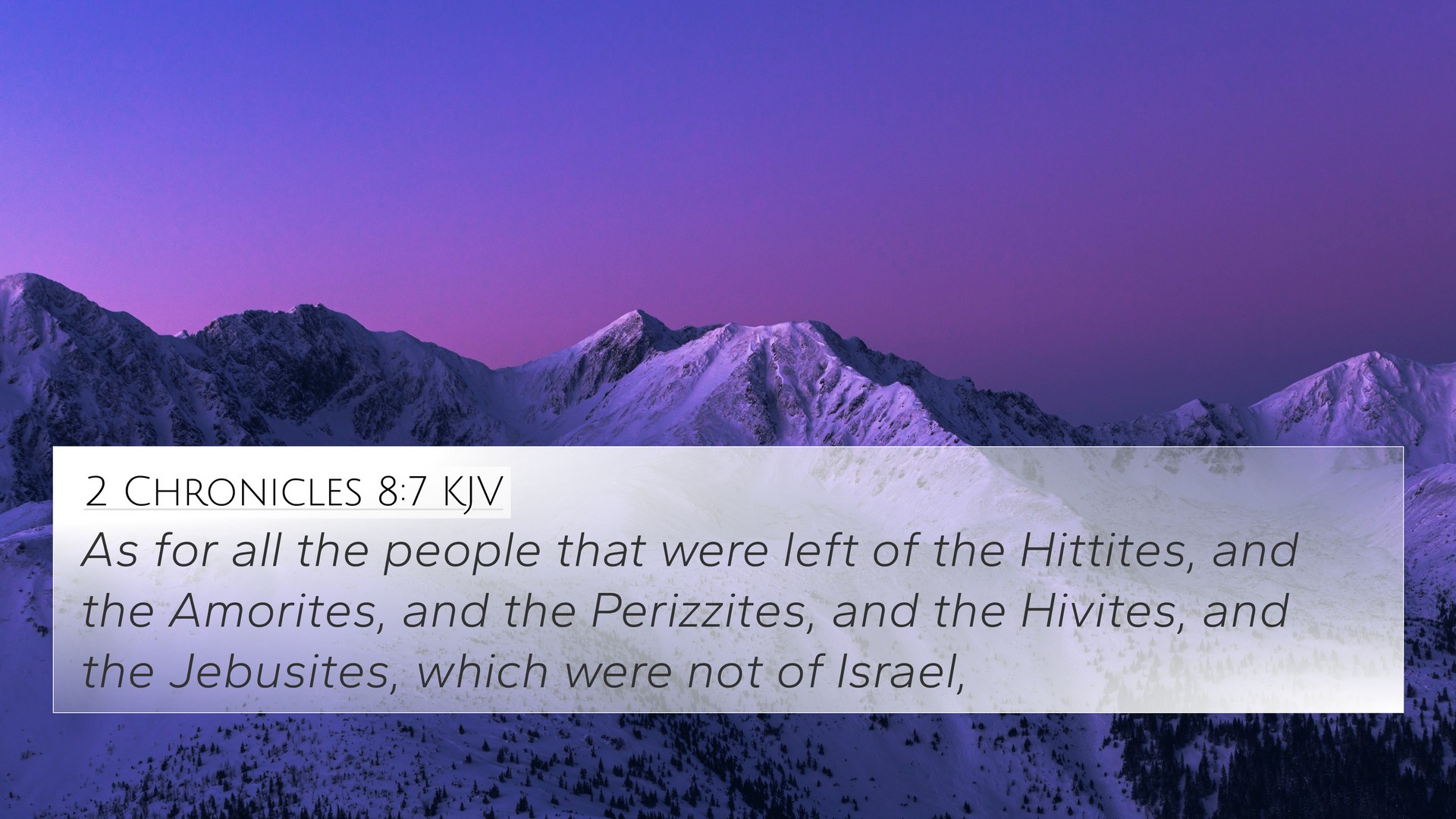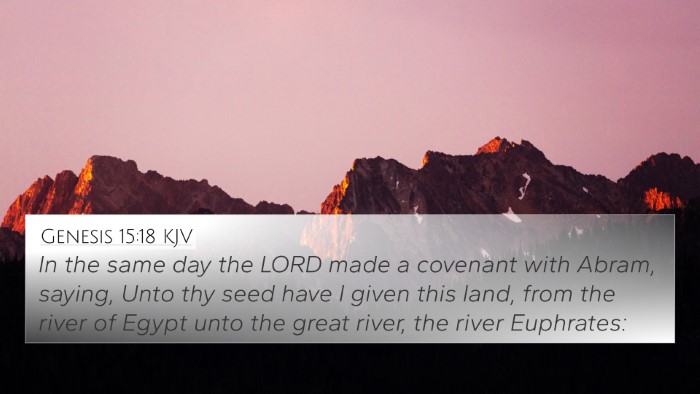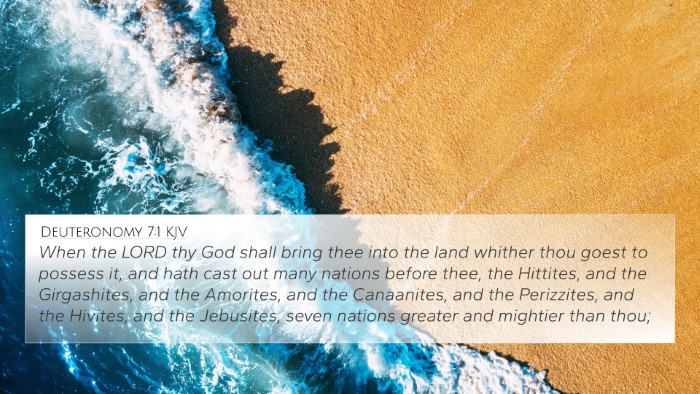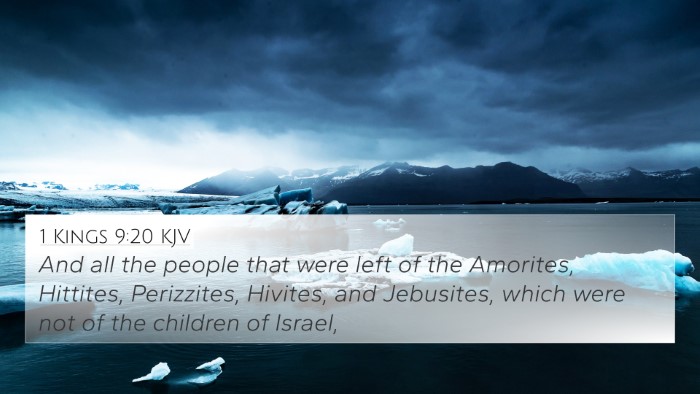Understanding 2 Chronicles 8:7
Verse Reference: 2 Chronicles 8:7
This verse states: "As for all the people that were left of the Hittites, and the Amorites, and the Perizzites, and the Hivites, and the Jebusites, which were not of Israel,"
Summary of Meaning
This verse reflects the historical context of King Solomon’s reign in Israel, particularly his dealings with the nations that occupied the land before the Israelites. It serves as a reminder of the interactions that persisted between the Israelites and the remaining inhabitants of the land following the conquest led by Joshua.
Insights from Public Domain Commentaries
Matthew Henry's Commentary
Matthew Henry elaborates on this verse by emphasizing God’s faithfulness in fulfilling His promises. Despite the presence of these nations, Israel was to remain distinct as God’s chosen people. The verse acknowledges the reality of foreign nations coexisting with Israel, which highlights their need for obedience to the covenant established by God.
Albert Barnes' Commentary
Albert Barnes provides an analysis of the tribes mentioned in this verse, outlining their historical significance. He suggests that these groups represented ongoing challenges for the Israelites. The presence of these nations serves as a backdrop for understanding the future conflicts that would arise, and the necessity for the Israelites to remain faithful to God's commandments to avoid temptation and sin.
Adam Clarke's Commentary
Adam Clarke points out the strategic importance of this passage in terms of territorial and political dynamics. He explains that Solomon's interactions with these groups were critical in establishing peace and trade relations. Clarke also notes the theological significance, highlighting the tendency of the Israelites to assimilate with these foreign nations, which would lead to spiritual and moral decline.
Inter-Biblical Connections
2 Chronicles 8:7 is significant not only in its immediate context but also in its connections to other biblical passages. Below are relevant cross-references that provide additional insights:
- Joshua 11:3 - Discusses the remnants of these nations post-conquest.
- Exodus 23:33 - Warns against the influence of the inhabitants to avoid sinning against God.
- Deuteronomy 7:1-2 - God's command to utterly destroy these nations to prevent corruption.
- 1 Kings 9:20-21 - References Solomon's dealings with the nations and their labor.
- 2 Samuel 5:6-10 - Illustrates David's conquests that set the stage for Solomon's reign.
- 1 Chronicles 22:2 - Relates the preparations Solomon made for building the temple involving foreign laborers.
- Isaiah 36:1 - Mentions the Assyrian engagement with Israel and significant geopolitical tensions.
Thematic Exploration
This verse invites deeper exploration into several themes:
- The Role of Foreign Nations: It encourages readers to consider how external influences can affect faith and practices.
- Covenant Faithfulness: The Israelite's need for adherence to God's laws is a dominant theme throughout the Old Testament.
- Divine Promise and Human Action: The interplay of God's promises and the Israelites' responses is essential to understanding biblical history.
Conclusion
2 Chronicles 8:7 functions as a crucial reminder of Israel's unique identity among the nations, the spiritual dangers of intermingling with foreign cultures, and the essential call for covenant faithfulness. Cross-referencing this verse with related verses enhances our understanding of the broader biblical narrative and deepens our comprehension of God’s intentions for His people.
Tools for Cross-Referencing
For those interested in exploring the connections between Bible verses, consider utilizing the following tools:
- Bible Concordance
- Bible Cross-Reference Guide
- Cross-Reference Bible Study Techniques
- Bible Reference Resources
- Comprehensive Bible Cross-Reference Materials
Further Exploration
For deeper study, ask yourself:
- What verses are related to 2 Chronicles 8:7?
- How do the experiences of Israelite interactions with foreign nations mirror challenges faced today?
- How can we apply the lessons of covenant faithfulness in our lives today?





